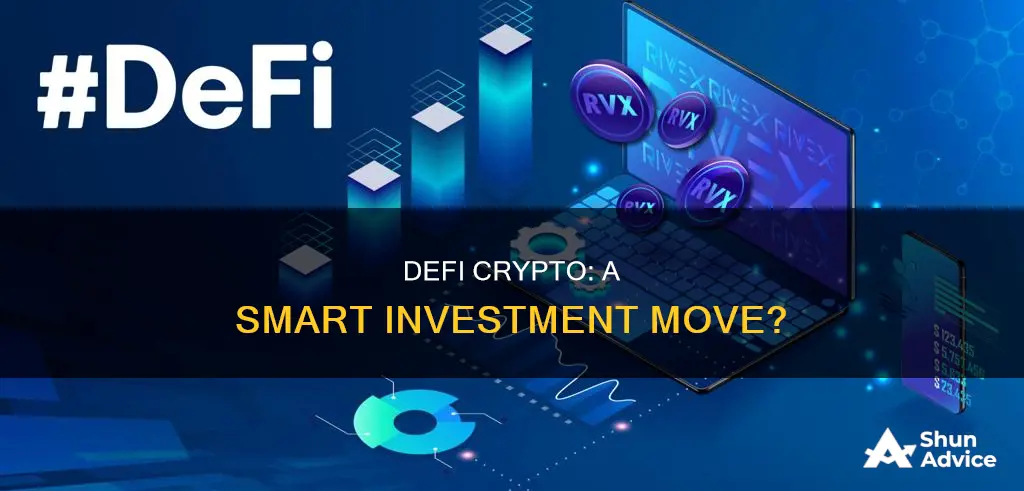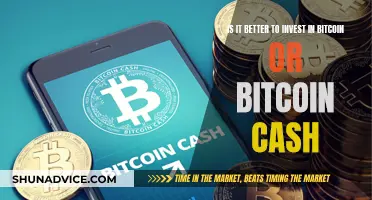
Decentralized finance, or DeFi, is an emerging financial technology that uses blockchain and cryptocurrency to manage financial transactions. DeFi aims to replace the current centralized financial system by empowering individuals with peer-to-peer transactions. It provides financial services like savings, loans, trading, and insurance directly to anyone with an internet connection, without the need for intermediaries such as banks. While DeFi offers advantages such as accessibility, low fees, and high interest rates, it also comes with risks, including the lack of consumer protections and the threat of hacking. With the DeFi market cap standing at over $35 billion and growing, it is worth considering whether investing in this space is a good idea.
| Characteristics | Values |
|---|---|
| Market Cap | $59.69 billion |
| Trading Volume | $4,494,535,211 |
| Total Value Locked (TVL) | $52 billion |
| Accessibility | Anyone with an internet connection can access a DeFi platform, and transactions occur without geographic restrictions. |
| Fees | Low fees. |
| Interest Rates | High interest rates. |
| Security | Security protocols, such as blockchain, are used. |
| Transparency | Smart contracts published on a blockchain and records of completed transactions are available for anyone to review but do not reveal your identity. |
| Anonymity | Transactions do not include an individual's name but are traceable. |
| Regulation | DeFi is unregulated and vulnerable to hacks and scams. |
| Consumer Protections | No consumer protections exist. |
| Collateralization | Nearly all DeFi lending transactions require collateral equal to at least 100% of the value of the loan. |
| Private Key Requirements | With DeFi and cryptocurrency, you must secure the wallets used to store your cryptocurrency assets with private keys. |
What You'll Learn

DeFi's lack of intermediaries means lower fees and higher interest rates
Decentralized finance (DeFi) is an emerging financial technology that leverages blockchain technology to remove intermediaries and centralized institutions from financial transactions. By eliminating intermediaries, DeFi reduces fees and offers higher interest rates.
DeFi uses blockchain technology to provide a secure and transparent network for peer-to-peer transactions. Blockchain technology enables direct interactions between peers, reducing the need for traditional intermediaries such as banks. This decentralization ensures that no single entity holds too much power or forms a monopoly.
In traditional finance, intermediaries charge fees for their services, which are necessary to facilitate transactions. These fees can be high, especially when multiple intermediaries are involved. By contrast, DeFi platforms automate many financial services, such as lending and trading, reducing the need for intermediaries and their associated fees.
DeFi also enables users to negotiate interest rates directly and lend cryptocurrency or money via DeFi networks. Without intermediaries taking a cut, users can access higher interest rates than those offered by traditional financial institutions.
Additionally, DeFi platforms provide increased accessibility. Anyone with an internet connection can access a DeFi platform and participate in financial transactions without geographic restrictions.
However, it is important to note that DeFi is still in its infancy and faces certain challenges. The lack of intermediaries can make it difficult to resolve disputes or seek recourse in the event of issues. Additionally, the decentralized nature of DeFi makes it susceptible to hacks and thefts due to sloppy programming and insufficient security measures.
Overall, DeFi's lack of intermediaries results in lower fees and higher interest rates for users. This feature, along with increased accessibility and transparency, makes DeFi an attractive alternative to traditional financial systems.
Onyxcoin: A Smart Investment Decision?
You may want to see also

DeFi is still in its infancy and is vulnerable to hacks and thefts
Decentralized finance (DeFi) is an emerging financial technology that leverages blockchain technology and cryptocurrencies to facilitate peer-to-peer transactions and provide financial services without the need for intermediaries. While DeFi offers numerous benefits, it is important to recognize that it is still in its early stages of development and faces certain vulnerabilities, particularly concerning security.
Infancy of DeFi
DeFi is a relatively new concept that is evolving and gaining traction. The total value locked (TVL) in DeFi has been growing, surpassing $50 billion as of mid-October 2023, indicating increasing user adoption. However, it is essential to understand that the industry is still in its infancy. The technology, protocols, and applications are all undergoing refinement and improvement. The lack of maturity in the DeFi ecosystem means that there are inherent risks and uncertainties associated with its use.
Vulnerability to Hacks and Thefts
One of the critical challenges faced by the DeFi space is its vulnerability to hacks and thefts. This susceptibility arises from a combination of factors, including:
- Immature Security Measures: The rapid development and deployment of DeFi applications sometimes result in sloppy programming and inadequate security testing. This can leave loopholes that hackers can exploit.
- Complexity of the Ecosystem: The DeFi ecosystem is intricate, with various layers interacting, including the blockchain, digital assets, smart contracts, and decentralized applications (dApps). The complexity provides a larger attack surface for potential hackers to target.
- Lack of Regulatory Framework: The decentralized nature of DeFi transcends traditional financial jurisdictions, making it challenging to establish clear regulatory guidelines. This lack of regulatory oversight can attract malicious actors who seek to exploit the system.
- User Error: DeFi often requires users to take full responsibility for their private keys and wallet security. User errors, such as losing private keys or falling victim to phishing attacks, can result in the loss of funds.
Enhancing Security in DeFi
While the vulnerabilities are real, it is important to acknowledge that the DeFi community is actively working to enhance security measures. Here are some aspects to consider:
- Smart Contract Audits: Encouraging comprehensive security audits of smart contracts by reputable firms can help identify vulnerabilities and reduce the likelihood of hacks.
- User Education: Educating users about security best practices, such as protecting private keys, recognizing phishing attempts, and conducting due diligence before interacting with new protocols or dApps, is essential.
- Collaboration with Regulators: Engaging with regulatory bodies to establish clear guidelines and oversight can help deter malicious activities and provide users with a level of protection.
- Development of Security Standards: Establishing industry-wide security standards and best practices can raise the bar for security across the entire DeFi ecosystem.
In conclusion, while DeFi offers immense potential to revolutionize finance, it is crucial to approach it with caution. Users and developers must prioritize security to mitigate the risks associated with hacks and thefts. As the industry matures and adopts more robust security measures, DeFi will become more resilient and trustworthy, fostering wider adoption and a more robust foundation for its long-term success.
MSTR: A Smart Bitcoin Investment Strategy?
You may want to see also

DeFi is open to anyone with an internet connection
Decentralized finance (DeFi) is a global, open-source, alternative financial system built for the internet age. It is designed to be accessible to anyone with an internet connection and is largely owned and maintained by its users.
DeFi is a collective term for financial products and services that are accessible to anyone who can use Ethereum. It is an all-inclusive term for any application that uses blockchain and cryptocurrency techniques or technology to offer financial services.
DeFi uses blockchain-powered technologies to provide financial services across various niches without the limitations of central systems or human censorship. It is also referred to as open finance.
How DeFi Works
DeFi uses peer-to-peer financial networks, security protocols, connectivity, software, and hardware advancements to eliminate the need for intermediaries like banks and other financial service companies.
DeFi applications are designed to communicate with a blockchain, allowing people to use their money for purchases, loans, gifts, trading, or any other way they want without a third party.
DeFi applications provide an interface that automates transactions between users by giving them financial options to choose from. For example, if you want to make a loan to someone and charge them interest, you can select the option on the interface and enter terms like interest or collateral.
Benefits of DeFi
DeFi has several benefits over traditional finance:
- Accessibility: Anyone with an internet connection can access a DeFi platform, and transactions occur without geographic restrictions.
- Low fees and high interest rates: DeFi enables any two parties to negotiate interest rates directly and lend cryptocurrency or money via DeFi networks.
- Security and transparency: Smart contracts published on a blockchain and records of completed transactions are available for anyone to review but do not reveal your identity.
- Autonomy: DeFi platforms don't rely on centralized financial institutions. The decentralized nature of DeFi protocols mitigates the need for and costs of administering financial services.
Risks of DeFi
While DeFi has the potential to revolutionize finance, there are also several risks and downsides to consider:
- No consumer protections: In the absence of rules and regulations, users may have little recourse if a transaction goes wrong.
- Hacking and theft: DeFi is still in its infancy and subject to hacks and thefts due to sloppy programming and a lack of security testing.
- Collateralization: Nearly all DeFi lending transactions require collateral equal to at least 100% of the loan value, which restricts who is eligible.
- Private key requirements: Losing the private key to your crypto wallet means losing access to your funds, with no way to recover it.
Bitcoin Miners: A Smart Investment Strategy?
You may want to see also

DeFi is a global financial system with access to global markets
DeFi: A Global Financial System with Access to Global Markets
Decentralized finance (DeFi) is a global, open-source, alternative financial system built for the internet age. It is designed to be accessible to anyone with an internet connection and provides users with control and visibility over their money.
DeFi is based on blockchain technology, specifically the Ethereum blockchain, which allows for secure, peer-to-peer transactions without the need for intermediaries such as banks. This means that users can send, receive, and invest their money globally without restrictions or centralized authorities blocking payments.
One of the key advantages of DeFi is its accessibility. Anyone can use DeFi products and services, regardless of their location or financial situation. This is in stark contrast to the traditional financial system, where financial intermediaries and institutions control access to money and services.
DeFi also offers users a wide range of financial services, including lending, borrowing, investing, and trading. These services are often automated and handled by code, making them safer and more efficient than traditional methods.
The DeFi market is growing, with tens of billions of dollars worth of crypto flowing through DeFi applications. This growth is driven by the benefits that DeFi offers, including:
- Global access and reach: Users can access global markets and alternative currencies, breaking free from the limitations of their local banking options.
- Transparency: DeFi is built on open-source technology, allowing anyone to inspect and scrutinize the code that handles their transactions.
- Efficiency: Services that were previously slow and prone to human error are now automated, making them faster and more reliable.
- Lower fees: By eliminating intermediaries, DeFi reduces the fees associated with financial transactions.
- Financial inclusion: DeFi enables people who were previously unbanked or underbanked to access financial services, improving financial inclusivity.
However, it is important to note that investing in DeFi also carries risks. The lack of regulations and consumer protections in the DeFi space means that users must be cautious. The complex nature of DeFi can make it difficult for average investors to distinguish between legitimate opportunities and scams.
Despite these risks, DeFi has the potential to revolutionize the global financial system by providing access, transparency, and efficiency to users around the world.
The Ultimate Guide to Investing in Biocoin
You may want to see also

DeFi is an alternative to traditional banking
Decentralized finance, or DeFi, is an emerging financial technology built on blockchain technology. It aims to create a more open and accessible financial ecosystem by enabling peer-to-peer transactions without intermediaries like banks. This makes DeFi an alternative to traditional banking systems, which are centralized and rely on intermediaries.
DeFi operates through a network of smart contracts that automate financial processes such as trading and lending. Smart contracts are encrypted programs that validate and execute transactions automatically. They are built on blockchain technology, which ensures security and transparency.
Benefits of DeFi Over Traditional Banking
DeFi offers several advantages over traditional banking:
- Greater Accessibility: DeFi is more accessible than traditional banks as it only requires an internet connection to access DeFi applications, whereas traditional banks require users to have a bank account and often impose geographic and credit history restrictions.
- Lower Fees: DeFi eliminates intermediaries, reducing transaction costs for users.
- Faster Transactions: Automated smart contracts in DeFi enable faster settlement times compared to the manual processes in traditional banking.
- Enhanced Transparency: Transactions in DeFi are recorded on a blockchain ledger, making them transparent and traceable.
- Increased Financial Inclusion: DeFi has the potential to provide financial services to unbanked or underbanked individuals, promoting greater financial inclusion.
- User Control and Autonomy: In DeFi, users hold their private keys and have complete control over their funds, allowing for greater autonomy in managing their finances.
Challenges and Risks of DeFi
While DeFi offers these benefits, it also faces challenges and risks:
- Security Concerns: Smart contracts can be hacked, and there is a risk of losing funds if users are not careful. The lack of regulations in DeFi means lower consumer protection compared to traditional banks.
- Price Volatility: DeFi is subject to significant price volatility due to its nascent nature.
- Regulatory Uncertainty: As DeFi grows, there may be a need for increased regulation to ensure user safety, which could impact its decentralized nature.
- Technical Barriers: DeFi may require users to have a certain level of technological literacy, which can be a barrier for some individuals.
DeFi has the potential to revolutionize the financial industry by increasing accessibility, reducing costs, and enhancing transparency. However, it also comes with risks and challenges that need to be addressed for widespread adoption. As the technology matures and regulatory frameworks evolve, DeFi could become a more viable alternative to traditional banking systems.
Global Crypto Investment: Who's Betting Big on Digital Currency?
You may want to see also







